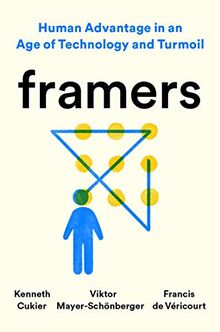
The authors of the breakout bestseller Big Data now turn to what more data can't accomplish: the unique ability humans have to frame new questions and so get better results than anyone could have previously imagined.
Everyone knows that the best decisions are based on data and lots of it. So now everyone needs to read FRAMERS, an investigation of both the limits of data-driven artificial intelligence and the irreplaceable ability that has enabled Homo sapiens' most enduring platforms of prosperity and happiness. Cukier, Mayer-Schönberger, and de Véricourt define exactly what is the most important thing humans will always do better than robots.
Frames are mental models of the world that we use to understand problems and to come up with new or refined solutions. As a tool, framing has always been with us. But as long as we were focused on traits like memory and reasoning that were more obviously essential to human cognition, framing didn't get much attention. Now that computers have become better at some of those cognitive tasks, framing stands out as a critical function--one that matters more than ever because it can't be handed off to the machines.
Framing means dreaming with constraints, letting your mind wander in a methodical and structured way, or wondering how old tools could be applied to new problems. FRAMERS shows how framing will not just be a way to improve how we make decisions in the era of algorithms but will be a matter of survival for humanity in the coming age of machine prosperity.